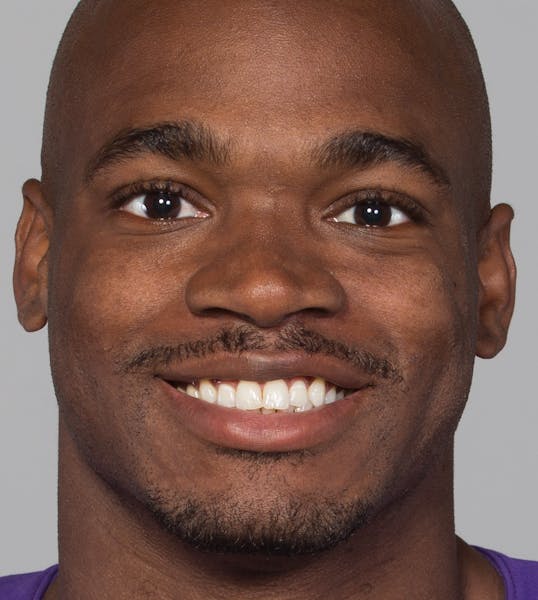INDIANAPOLIS – Within 90 minutes of each other, Rick Spielman, John Harbaugh and Mike Pettine each stood on a podium, bracing themselves behind a lectern in anticipation of pointed questions.
Spielman, the general manager of the Vikings, survived an onslaught of questions about suspended running back Adrian Peterson, still in limbo after his child-abuse charge.
Harbaugh, coach for the Baltimore Ravens, only faced one question that was loosely related to his former running back, Ray Rice, another face of the NFL's domestic violence crisis.
Pettine, entering his second year as the Cleveland Browns' coach, was asked about suspended wide receiver Josh Gordon, who served as a foil of sorts to Peterson and Rice because his off-the-field issues were inhaled and not inflicted on others, and quarterback Johnny Manziel, who is currently in rehab after his hard-partying ways continued in the NFL.
As those three men and other decision-makers from each of the NFL's 32 teams began their first wave of prospect interviews at the NFL's scouting combine on Wednesday night, there was no denying that the climate of the league has changed since the last time the league descended on Indianapolis for this annual event.
"The players coming out have to realize that they're going to be scrutinized even more because of the environment that we're in right now," Spielman said.
After video of Rice punching his then-fiancée in an elevator went viral in September, NFL Commissioner Roger Goodell, brandishing his beefed-up player conduct policy, flexed his muscles and suspended Rice indefinitely.
Days later, the chilling charge against Peterson came to light, and Goodell, with permission from the Vikings, placed him on his special exempt list, the first step in Peterson being sidelined for the rest of the 2014 season.
With the league subsequently under siege because of those two highly publicized incidents and the NFLPA so far unsuccessful in its attempts to rein in Goodell's power, NFL teams are aware that off-the-field player conduct will be under the microscope and that one serious transgression might be enough for a team to lose a talented but troubled player indefinitely.
"There will be some players that are here at the combine that have had some issues that I know you're going to have to go through that process to feel comfortable [drafting them]," Spielman said.
Spielman didn't mention specific players, but three potential first-round picks won't be answering many football questions from executives, coaches and scouts this week.
Florida State quarterback Jameis Winston, the frontrunner to be the top pick in the NFL draft, was accused of sexual assault, arrested for shoplifting crab legs and suspended for shouting a vulgarity during his time in Tallahassee.
Washington cornerback Marcus Peters was kicked off his team for repeatedly bumping heads with his head coach.
Missouri wide receiver Dorial Green-Beckham also got the boot from his college team after multiple marijuana arrests and an accusation of domestic violence.
For many general managers and head coaches, this week will be their first opportunity to have an eye-to-eye conversation with prospects such as those three, though they are only guaranteed 15 minutes with a requested prospect before the buzzer sounds and the player is shuffled away to another meeting room.
"It's kind of like speed dating," Spielman said. "Because you wish you had more time."
Of the 60 formal interviews the Vikings can request, some will be strictly about football. Some will focus largely on character concerns as they try to determine if the issues are simply immaturity or the precursor for more, and potentially worse, incidents.
The Vikings already have taken a few players off the board because of character concerns. Once they are finished completing interviews and the results of their psychological testing of prospects have been received, they will make a final determination on a handful of prospects that are currently "in purgatory," as Spielman put it. Some will go up on the draft board. Others will be deemed lost causes and removed from consideration.
"Can we handle it internally? Do we have enough support staff that are expert in those areas to handle it?" Spielman said. "If we can't, then you move on. But I think that's up to each individual club how they vet through that process."
Spielman vowed the Vikings, who have led the league in arrests since 2000, will be even more careful when it comes to gambling on troubled players from now on. He predicted other NFL teams will also tread more lightly, too.
But Harbaugh questioned what more the Ravens could do to investigate prospects than what they're already doing. After all, Rice, like Peterson, was a model citizen until last year.
"I would be hard-pressed to know how we can look at it any closer than what we have — especially legally," Harbaugh said. "There is only so much that you can do in terms of digging into people's background and respecting people's privacy."
Pettine, meanwhile, said it would be even more difficult for his Browns to build a winning team if they shied away from every player who "has any type of red flag."
"There's a danger in that, that if you just say, 'We're only going to add players to our roster who are in the National Honor Society and the school choir," Pettine said. "It's rare you're going to have somebody who has impeccable, clean character. It's all risk-reward. You've got to weigh it."
But in today's NFL, it appears Goodell's scale of justice will be much less forgiving going forward.
Anze Kopitar scores in overtime, Kings beat Oilers 5-4 in Game 2 to tie series
Defending champion Golden Knights beat Stars 3-1 to take 2-0 series lead home to Vegas

